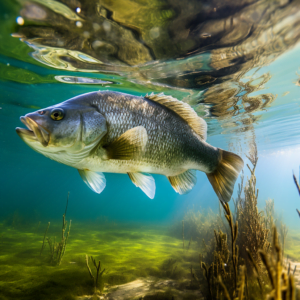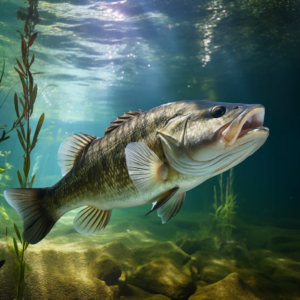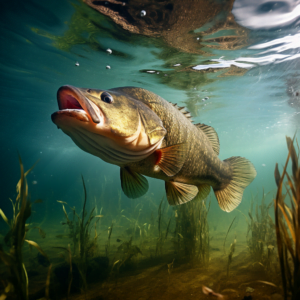So, you’re out on a fishing trip and you catch a big, beautiful bass. Now comes the big decision – should you keep it or release it? It’s a question that many anglers face, and it’s one that has sparked plenty of debate. In this article, we’re going to dive into the pros and cons of keeping or releasing bass, so you can make an informed decision the next time you’re reeling in that trophy fish.
Let’s start by discussing the benefits of keeping the bass. Many anglers enjoy the thrill of catching their own meal, and bass can be a tasty treat when cooked up just right. Plus, keeping the fish can provide a sense of accomplishment and pride, especially if it’s a personal best or a particularly impressive specimen. And let’s not forget the bragging rights – showing off that big bass to your friends and family can be quite the conversation starter.
However, there are also valid reasons for releasing bass. Bass are a valuable resource in our lakes and rivers, and releasing them ensures that they can continue to spawn and sustain healthy populations. By letting the bass go, you’re contributing to the conservation efforts and ensuring that future anglers can also enjoy the thrill of catching these incredible fish. Additionally, releasing bass allows them to grow larger and potentially reach trophy size, adding excitement for both you and future anglers.
In conclusion, the decision to keep or release bass ultimately comes down to personal preference and the specific circumstances. There are advantages and disadvantages to both options, but it’s important to consider the long-term impact and conservation efforts when making your decision. So, next time you hook into a bass, think about what you value more – a delicious meal or the chance to contribute to the ongoing health and excitement of bass fishing.
Benefits of Keeping Bass
Healthy Food Source
One of the main benefits of keeping bass is that it provides a healthy food source. Bass is a popular fish among anglers and is known for its delicious taste. By keeping bass, you can easily enjoy the satisfaction of catching your own dinner. Bass is also a good source of omega-3 fatty acids, which are essential for brain health and may help reduce the risk of heart disease.
Reducing Overpopulation
Another advantage of keeping bass is that it helps reduce overpopulation. Bass are known for their prolific reproductive abilities, and their numbers can quickly multiply if left unchecked. By catching and keeping bass, you are helping to control their population and maintain a healthier balance in the ecosystem. This can prevent overpopulation and the potential negative consequences it may have on other fish species and the overall environment.
Supporting Local Economy
Keeping bass can also have positive effects on the local economy. Bass fishing is a popular recreational activity, and by keeping bass, you are supporting local businesses such as bait shops, fishing guides, and fishing gear retailers. Fishing enthusiasts often travel to different areas to pursue their hobby, leading to increased tourism and revenue for local communities. By keeping bass, you are contributing to the economic growth of the region and supporting the livelihoods of local residents.
Benefits of Releasing Bass
Conservation of Fishing Stock
Releasing bass instead of keeping them can contribute to the conservation of fishing stock. When you release bass back into the water, you allow them to grow and reproduce, ensuring a sustainable population for future generations of anglers. By practicing catch-and-release, you are helping to maintain a healthy balance between the number of fish caught and the number of fish that can reproduce and replenish the population. This is crucial for the long-term sustainability of bass fishing.
Maintaining Biodiversity
Releasing bass also helps maintain biodiversity in freshwater ecosystems. Bass play a vital role in the food chain, and by letting them go, you are ensuring the availability of prey for other fish species. This promotes a diverse ecosystem with a wide range of aquatic life, contributing to the overall health and stability of the ecosystem. By releasing bass, you are helping to preserve the natural balance of the aquatic environment.
Ensuring Sustained Recreation
The release of bass also ensures sustained recreation for anglers. By letting bass go, you are allowing other anglers to experience the joy and excitement of catching these fish. This helps in preserving the recreational value of bass fishing, as more people get the opportunity to enjoy the sport. The more people engage in catch-and-release practices, the more the fishing stock will be sustained, providing continued recreation for generations to come.
Factors to Consider Before Keeping Bass
Fishing Regulations
Before keeping bass, it is essential to familiarize yourself with local fishing regulations. Each state or region may have specific rules and regulations regarding the size, bag limit, and seasons for bass fishing. It is important to adhere to these regulations to ensure the sustainability of the fish population and to avoid potential legal consequences. Ignorance of the rules is not an excuse, so make sure you are well-informed before keeping bass.
Environmental Impact
Keeping bass can have an environmental impact, especially when done irresponsibly. It is crucial to consider the potential consequences of removing bass from their natural habitat. Bass help control the population of smaller fish species, and their removal can disrupt the natural balance in the ecosystem. Additionally, improper handling of caught bass or the use of harmful fishing practices can harm other aquatic species or damage sensitive habitats. Always be considerate of the environment and strive to minimize your impact as much as possible.
Fish Size and Reproduction Potential
Size and reproduction potential are important factors to consider before keeping bass. Keeping smaller bass can disrupt their breeding cycle, as these fish may not have had the opportunity to reproduce yet. It is generally recommended to release smaller bass to allow them to grow and contribute to the future population. On the other hand, keeping larger bass can have less impact on the overall population size, as these fish have likely already reproduced. Consider the size and reproductive potential of the bass you catch before deciding whether to keep them or release them.
Consequences of Keeping Bass
Decline in Fish Population
One of the significant consequences of keeping bass is the potential decline in the overall fish population. Keeping bass removes individuals from the population, which can lead to a decrease in the number of breeding adults. This reduces the number of offspring produced and can ultimately lead to a decline in the overall population size. If too many bass are removed from the ecosystem, it can disrupt the natural balance and negatively impact other fish species that rely on bass for food or prey.
Imbalance in Ecosystem
Keeping bass can also lead to an imbalance in the ecosystem. As mentioned earlier, bass play a crucial role in controlling the population of smaller fish species. By removing bass from the ecosystem, the population of these smaller fish can increase rapidly, potentially leading to overcrowding and competition for resources. This imbalance can have cascading effects on the entire food chain and disrupt the stability of the aquatic ecosystem.
Negative Impact on Future Fishing
Keeping bass excessively can have a negative impact on future fishing opportunities. Overfishing can deplete the population to a point where it becomes difficult to catch bass. This can result in a decline in the overall quality of fishing experiences, as well as the economic impact on local businesses that rely on bass fishing. By practicing responsible catch-and-release and only keeping bass when necessary, you can help ensure the sustainability of the fishery and preserve the future enjoyment of bass fishing.
Factors to Consider Before Releasing Bass
Environmental Conditions
Before releasing bass, it is important to consider the environmental conditions. Bass are more likely to survive and thrive when released into suitable habitats. Ensure that water conditions, such as temperature and oxygen levels, are ideal for the bass to survive after release. Poor environmental conditions can increase stress on the fish and reduce their chances of survival. If conditions are not favorable, it may be better to keep the bass or find an alternative release location where they are more likely to survive.
Fish Health
The health of the bass is another important factor to consider before releasing them. If a bass shows signs of being injured or sick, it may have a reduced chance of survival after release. In such cases, it may be more humane to keep the bass rather than subjecting it to potential suffering. Before releasing a bass, carefully examine it for any signs of injury or illness. If any doubts arise about its health, it is better to err on the side of caution and keep the fish.
Fishing Objectives
Your fishing objectives should also be taken into account before releasing bass. If your primary goal is to catch and keep fish for food, releasing bass may not align with your objectives. However, if you fish for the enjoyment of the sport and prioritize conservation, releasing bass can be a rewarding practice. Consider what you hope to achieve from your fishing experience and make a decision that aligns with your personal values and goals.
Consequences of Releasing Bass
Introduction of Non-Native Species
Releasing bass can inadvertently lead to the introduction of non-native species into ecosystems. In some cases, anglers may mistakenly release non-native bass species, such as smallmouth bass or largemouth bass, into waters where they are not naturally present. These non-native species can compete with native species for resources and may have a negative impact on the ecosystem. It is important to be aware of the specific regulations and guidelines regarding the release of bass in a particular area to avoid introducing non-native species unintentionally.
Potential for Overcrowding
Releasing bass without considering the carrying capacity of the water body can lead to overcrowding. If a water body already has a high population of bass, the addition of more fish through releases can create an imbalance and result in overcrowding. Overcrowding can have detrimental effects on the health and growth of the fish population, leading to stunted growth, increased competition for resources, and decreased overall health of the fish. Avoid releasing bass into waters that are already densely populated to prevent overcrowding.
Decreased Size and Quality of Catch
Releasing bass can also potentially diminish the size and quality of future catches. When bass are released, they have the opportunity to grow larger and contribute to the overall size of the fish population. Releasing bass allows them to reproduce, ensuring the presence of younger and smaller fish in the future. These fish have the potential to grow and become larger, providing more exciting and rewarding catches for anglers. By releasing bass, you are giving yourself and future anglers the opportunity to catch bigger and better fish.
Expert Opinions on Keeping Bass
Conservation Biologists
Conservation biologists generally advocate for responsible catch-and-release practices to ensure the long-term sustainability of fish populations. They highlight the importance of preserving biodiversity and maintaining balanced ecosystems. They encourage anglers to prioritize the conservation of fish stocks and consider the potential impacts of their actions on the overall environment.
Fishery Managers
Fishery managers are responsible for overseeing and maintaining healthy fish populations. They often establish fishing regulations and guidelines to protect bass and other fish species. Fishery managers may recommend catch-and-release practices, especially in areas where fish populations are at risk or have been overexploited. They work to strike a balance between conservation efforts and the interests of anglers.
Experienced Anglers
Experienced anglers often have a deep understanding of the importance of conservation and the benefits of catch-and-release practices. Through their own experiences, they have witnessed the positive effects of releasing bass on the overall health and abundance of fish populations. Many experienced anglers promote responsible fishing practices and encourage others to release bass when appropriate.
Expert Opinions on Releasing Bass
Catch-and-Release Advocates
Catch-and-release advocates strongly support the practice of releasing bass. They emphasize the preservation of fish stocks and the long-term sustainability of fishing activities. They argue that by releasing bass, anglers can contribute to the conservation of fish populations and ensure future generations can enjoy the sport of fishing.
Fishery Scientists
Fishery scientists conduct research to understand the behavior, biology, and abundance of fish populations. Their studies often inform fisheries management decisions, including recommendations for catch-and-release practices. Many fishery scientists advocate for releasing bass to maintain healthy populations and help preserve the overall integrity of aquatic ecosystems.
Tournament Organizers
Tournament organizers often promote catch-and-release practices during fishing competitions. They recognize the economic and recreational value of bass fishing and aim to ensure the sustainability of tournament fisheries. By encouraging participants to release bass, tournament organizers help safeguard fish populations and promote ethical fishing practices.
Best Practices for Keeping Bass
Follow Size and Bag Limits
When keeping bass, it is crucial to follow size and bag limit regulations. These limits are typically designed to protect the fish population and ensure that enough fish are left to reproduce and maintain a healthy population. By adhering to these limits, you contribute to the conservation efforts and help maintain the balance of the fishery.
Proper Handling and Care
Proper handling and care of bass are essential when keeping them. It is important to minimize stress on the fish by handling them with wet hands, using landing nets, and avoiding damage to their gills or scales. Once caught, bass should be quickly and safely placed in a suitable container or live well with sufficient oxygen and proper water temperature. The sooner you can release them back into their natural habitat, the better their chances of survival.
Utilizing Excess Catch
To minimize waste and make the most out of your catch, consider utilizing excess bass. Bass can be cleaned and prepared for consumption, providing a fresh and healthy source of food. Properly cooked bass can be a delicious addition to your meals. By utilizing excess catch and avoiding waste, you can appreciate the value of the fish you catch while still practicing responsible fishing.
Conclusion
The decision to keep or release bass ultimately depends on your personal values and fishing objectives. Both choices have their own merits and potential consequences. Should you keep bass, you can enjoy the satisfaction of catching your own healthy food source, contribute to the local economy, and help control overpopulation. However, keeping bass also comes with risks such as declining fish populations, imbalance in the ecosystem, and negative impacts on future fishing opportunities.
On the other hand, releasing bass can contribute to the conservation of fishing stock, maintaining biodiversity, and ensuring sustained recreation for future generations. However, releasing bass also has its risks, including the potential introduction of non-native species, overcrowding, and potential decrease in the size and quality of your catch.
Before making a decision, it is important to consider factors such as fishing regulations, environmental impact, fish size and reproduction potential, environmental conditions, fish health, and your fishing objectives. Seek expert opinions from conservation biologists, fishery managers, experienced anglers, catch-and-release advocates, fishery scientists, and tournament organizers to make an informed choice.
In the end, it is essential to balance conservation and enjoyment. As an angler, you have a responsibility to act ethically and consider the long-term sustainability of fish populations. By being mindful of your actions and making informed decisions, you can enjoy bass fishing while contributing to the preservation of these magnificent fish and the natural ecosystems they inhabit.




